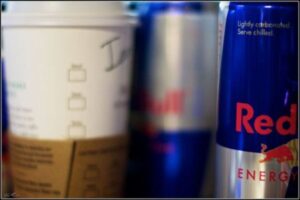Need A Lift or A Jolt? Natural Vs. Synthetic Caffeine

There’s no shortage of confusing information about whether or not caffeine is actually good for you. Recent studies have linked coffee consumption with a number of benefits like lower prostate risk for men and decreased risk of depression for women. Camellia sinensis—the tea plant—has also been proven effective in a number of health-giving properties including the presence of powerful antioxidants known to prevent cancer. And naturally occurring caffeine actually has its own exclusive antioxidant benefits (in addition to the ones found in coffee or tea), which may help to prevent heart disease and Alzheimer’s. But what about the caffeine added to energy drinks, juices, chocolates and sodas? How does that affect our bodies?
Although we typically think of coffee or tea in relation to caffeine, there are only around 60 known types of plants that contain naturally occurring caffeine versus the hundreds—if not thousands—of those manufactured products that contain the synthetic kind. Synthetic caffeine, like those found in most sodas and energy drinks, are produced in laboratories and manufactured in factories, which provide a much more potent caffeine isolate than what’s found naturally occurring in the plant kingdom. Synthetic caffeine is made by a chemical synthesis of urea as the raw material and can also be exposed to a number of harsh chemicals including: methylene chloride, ethyl acetate and carbon dioxide.
Synthetic caffeinewill absorb through the digestive system much faster than the naturally occurring plant caffeine. This means a quicker spike, and of course, a quicker crash—unlike the naturally occurring caffeine in plants such as yerba mate, a leafy green shrub that grows throughout South America and provides a balanced caffeine ‘lift’ (largely due to also present high level of naturally occurring vitamins that prevent the caffeine crash). Even coffee and black tea will provide a more sustained energy from the naturally occurring caffeine than the artificial stuff found in soda.
While many people drink coffee daily without experiencing negative side effects such as difficulty sleeping, nervousness, heart palpitations or nausea, the opposite may be true when consuming synthetics that do not have the balancing effects of the entire botanical to help regulate the body’s reaction to the energizing properties of caffeine.
When shopping for caffeinated beverages, here’s a useful tip: If you see the word “caffeine” on the ingredient list, that means it’s synthetic. If natural plants containing caffeine are added, you will see the actual name of the botanical, such as guarana or green tea.
Keep in touch with Jill on Twitter @jillettinger
sources:
http://facultystaff.vwc.edu/~jeaster/courseinfo/312/312Nature2003.html
http://www.webmd.com/diet/news/20110506/new-clues-on-caffeines-health-benefits
http://newsfeedresearcher.com/data/articles_m48/coffee-cancer-risk.html
image: ianmunroe

